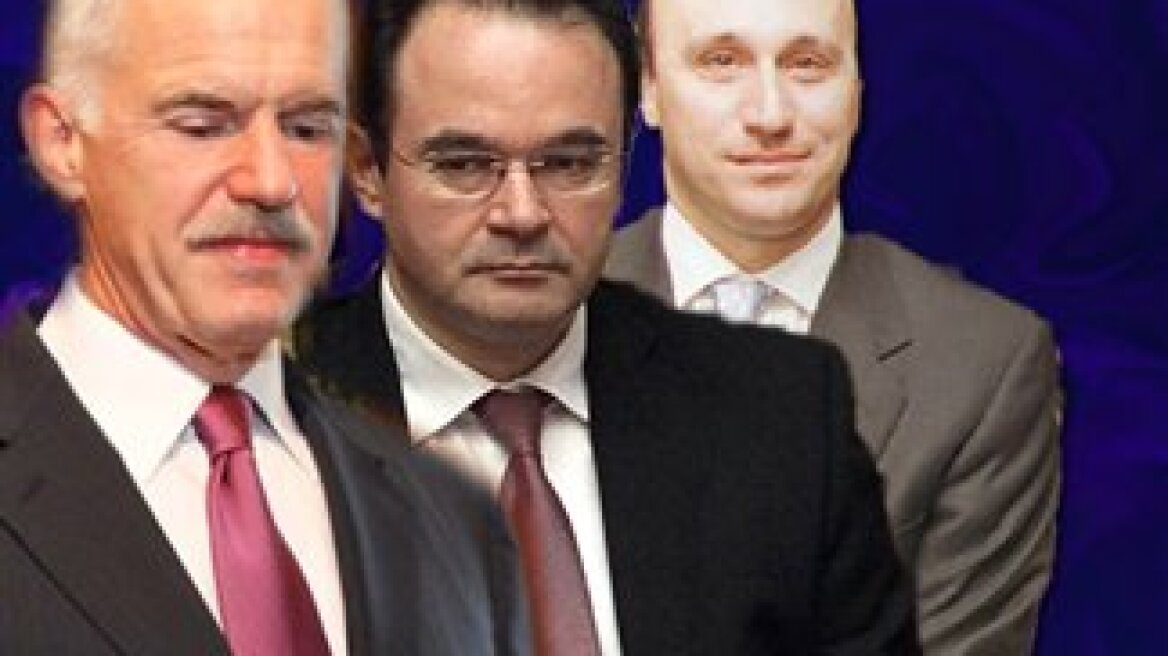
The final blow for Papakonstantinou by the president of PDMA
The final blow for Papakonstantinou by the president of PDMA
PDMA chief Petros Christodoulou was relentless in his appearance before the parliamentary inquiry committee investigating the EL.STAT. case on criminal manipulations by former Finance minister Giorgos Papakonstantinou which led the country unconditionally into the arms of the IMF. Christodoulou was appointed to the Public Debt Management Agency by Papakonstantinou and followed closely all government handlings in the critical months of 2009 - 2010, during which the country desperately tried to borrow from the international markets. This makes his testimony very important and the responsibilities he places on Papakonstantinou extremely incriminatory.

UPD:
PDMA chief Petros Christodoulou was relentless in his appearance before
the parliamentary inquiry committee investigating the EL.STAT. case on
criminal manipulations by former Finance minister Giorgos
Papakonstantinou which led the country unconditionally into the arms of
the IMF. Christodoulou was appointed to the Public Debt Management
Agency by Papakonstantinou and followed closely all government handlings
in the critical months of 2009 - 2010, during which the country
desperately tried to borrow from the international markets. This makes
his testimony very important and the responsibilities he places on
Papakonstantinou extremely incriminatory.
Speaking to the inquiry committee, Christodoulou clarified that "Papakonstantinou’s statements about the Titanic were unfortunate" as "unfortunate were also the statements about the IMF when the country was looking to borrow from the markets."
Christodoulou explained to the committee members that "when you are dealing with the market, you have to keep a poker-faced attitude, because you have to earn and maintain the temper of the market, its positive attitude, and you should not scare the market into turning against you. Then, and while we had drawn up a very successful decade edition, there had been some comments that if we did not get any help from Germany, we would go to the IMF. It was an unfortunate position for the markets. Because while markets kept hearing that our bonds were doing well, the spreads were falling, etc., they suddenly said 'since they did raise money and are doing very well, why do they keep on threatening us that they will go to the IMF?' And suddenly they freaked out."
However, Christodoulou declined to say directly who was the one who made the statements about the IMF, noting that "as a mere technocrat I just said 'do not clutter up the market'. But with this observation he indicated former prime minister George Papandreou, as the latter was the first who spoke about the IMF. Elsewhere in his testimony, he said that "when we started in April 2010, we drew up a very successful five-year bond edition, a very successful decade edition and the spreads had begun to calm down in Greece, and suddenly I was informed that within a month we would have another review and I was dumbstruck."
Kontopirakis: Papakonstantinou was looking for a scapegoat
But Manolis Kontopirakis, the former head of the National Statistical Office during the New Democracy administration, accused Papakonstantinou in his deposition. He claimed that while he was ready to send data to Eurostat, according to which the 2009 deficit would be 6%, Papakonstantinou asked him to not send this information because, as he told him he "was going to change it" and that Kontopirakis should send other information to Eurostat. Kontopirakis said that a few days after the elections of October 2009, the Finance ministry had "four different scenarios to decide which was the best to send."
Speaking to the inquiry committee, Christodoulou clarified that "Papakonstantinou’s statements about the Titanic were unfortunate" as "unfortunate were also the statements about the IMF when the country was looking to borrow from the markets."
Christodoulou explained to the committee members that "when you are dealing with the market, you have to keep a poker-faced attitude, because you have to earn and maintain the temper of the market, its positive attitude, and you should not scare the market into turning against you. Then, and while we had drawn up a very successful decade edition, there had been some comments that if we did not get any help from Germany, we would go to the IMF. It was an unfortunate position for the markets. Because while markets kept hearing that our bonds were doing well, the spreads were falling, etc., they suddenly said 'since they did raise money and are doing very well, why do they keep on threatening us that they will go to the IMF?' And suddenly they freaked out."
However, Christodoulou declined to say directly who was the one who made the statements about the IMF, noting that "as a mere technocrat I just said 'do not clutter up the market'. But with this observation he indicated former prime minister George Papandreou, as the latter was the first who spoke about the IMF. Elsewhere in his testimony, he said that "when we started in April 2010, we drew up a very successful five-year bond edition, a very successful decade edition and the spreads had begun to calm down in Greece, and suddenly I was informed that within a month we would have another review and I was dumbstruck."
Kontopirakis: Papakonstantinou was looking for a scapegoat
But Manolis Kontopirakis, the former head of the National Statistical Office during the New Democracy administration, accused Papakonstantinou in his deposition. He claimed that while he was ready to send data to Eurostat, according to which the 2009 deficit would be 6%, Papakonstantinou asked him to not send this information because, as he told him he "was going to change it" and that Kontopirakis should send other information to Eurostat. Kontopirakis said that a few days after the elections of October 2009, the Finance ministry had "four different scenarios to decide which was the best to send."
He also claimed that the calculation of the deficit is a political decision and that the role he had was just functional. "I knew that one prediction was for 6% and another for 12.5%. I imagine that each prediction is based on different data. Which is the right one? That would be the actions of the government".
Finally, he denied that in his communication with EU officials in October 2009 he was told that Papakonstantinou was determined to remove him as "he was looking for a scapegoat."
Finally, he denied that in his communication with EU officials in October 2009 he was told that Papakonstantinou was determined to remove him as "he was looking for a scapegoat."
UPD:
Ακολουθήστε το protothema.gr στο Google News και μάθετε πρώτοι όλες τις ειδήσεις
Δείτε όλες τις τελευταίες Ειδήσεις από την Ελλάδα και τον Κόσμο, τη στιγμή που συμβαίνουν, στο Protothema.gr
Δείτε όλες τις τελευταίες Ειδήσεις από την Ελλάδα και τον Κόσμο, τη στιγμή που συμβαίνουν, στο Protothema.gr
ΡΟΗ ΕΙΔΗΣΕΩΝ
Ειδήσεις
Δημοφιλή
Σχολιασμένα






































